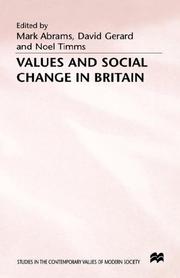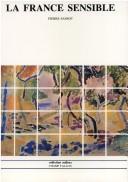| Listing 1 - 7 of 7 |
Sort by
|

ISBN: 0333386760 0333386779 Year: 1985 Publisher: Basingstoke Macmillan
Abstract | Keywords | Export | Availability | Bookmark
 Loading...
Loading...Choose an application
- Reference Manager
- EndNote
- RefWorks (Direct export to RefWorks)
Social values --- Valeurs sociales --- Great Britain --- Grande-Bretagne --- Social conditions --- Conditions sociales --- ro: ed. by
Book
ISBN: 046506325X Year: 1985 Publisher: New York : Basic books,
Abstract | Keywords | Export | Availability | Bookmark
 Loading...
Loading...Choose an application
- Reference Manager
- EndNote
- RefWorks (Direct export to RefWorks)
Valeurs sociales --- Enfants --- Éducation des enfants --- Aspect économique --- Sociologie --- Opinion publique --- États-Unis --- 1870-1914 --- 1900-1945 --- 20e siècle

ISBN: 290352856X Year: 1985 Publisher: Seyssel
Abstract | Keywords | Export | Availability | Bookmark
 Loading...
Loading...Choose an application
- Reference Manager
- EndNote
- RefWorks (Direct export to RefWorks)
Regional documentation --- France --- National characteristics, French --- Caractéristiques nationales françaises --- Civilization --- Description and travel --- Civilisation --- Descriptions et voyages --- Caractéristiques nationales françaises --- Caractère national français. --- National characteristics, French. --- Français --- Campagne --- Valeurs sociales --- Identité collective. --- Civilization. --- Philosophy
Book
ISBN: 2724605126 Year: 1985 Publisher: Paris : Presses de la Fondation nationale des sciences politiques,
Abstract | Keywords | Export | Availability | Bookmark
 Loading...
Loading...Choose an application
- Reference Manager
- EndNote
- RefWorks (Direct export to RefWorks)
Spy stories, French --- French fiction --- Nationalism in literature --- Politics in literature --- Social values in literature --- Roman français --- Nationalisme dans la littérature --- Politique dans la littérature --- Valeurs sociales dans la littérature --- History and criticism --- Histoire et critique

ISBN: 9004076190 9004328254 9789004076198 9789004328259 Year: 1985 Volume: 90 Publisher: Leiden: Brill,
Abstract | Keywords | Export | Availability | Bookmark
 Loading...
Loading...Choose an application
- Reference Manager
- EndNote
- RefWorks (Direct export to RefWorks)
The crisis Rome experienced in the last decades of the Republic was intellectual as well as political, social and military. This crisis was marked by conflicts over values and a growing dichotomy between words and things, as a result of which the key words of the Roman tradition lost their anchor in the inherited, commonly-held percepetion of reality known as the mos maiorum . The crisis was therefore also one of the Latin language itself. The monograph explores this thesis in discussions of the background and character of Roman intellectual history, the nature of the mos maiorum , the relationship of the Late Republic to the Mediterranean world, the roles of Julius Caesar, Catullus, Cicero, and Lucretius in the crisis, and its Augustan and later consequences. The major portion of the discussion is devoted to Lucretius, because the De Rerum Natura is the clearest example of the extent and nature of the crisis, from which it took its origin and gained its form and purpose. A principal goal of the essay is to relate Lucretius to the structure of Roman literary and intellectual history. It finds the explanation for his work in the nature of that history and the characteristic Roman modes and categories of thought rather than in the general history fo Greek philosophy. It also offers a new explanation of the relationshiop of the authors of the Late Republic to each other. In so doing, it indicates the foundation for a new history of Roman literature and a new conception of the reality and importance of the intellectual history of Rome.
Classical Latin literature --- History of civilization --- Lucretius Carus, Titus --- Rome --- Philosophy, Ancient --- Political science --- Social values --- Philosophie ancienne --- Science politique --- Valeurs sociales --- Lucrèce, --- Didactic poetry, Latin --- History and criticism --- Intellectual life --- -Latin didactic poetry --- Latin poetry --- Lukrecjusz Karus, Tytus --- Lukret︠s︡iĭ Kar, Tit --- Lucrezio, Tito --- Lucrèce --- Lucrez --- Lucrecio Caro, T. --- Caro, T. Lucrecio --- Carus, Titus Lucretius --- Lucretius --- Lucrezio Caro, Tito --- Lucrecio --- Lucreti Cari, T. --- Lucreci --- לוקרציוס קרוס, טיטוס --- Intellectual life. --- History and criticism. --- Lucretius Carus, Titus. --- -History and criticism --- Lucrèce --- Lukrez --- History --- Latin literature --- Republic, 265-30 B.C. --- Civilization --- Moral conditions --- Rim --- Roman Empire --- Roman Republic (510-30 B.C.) --- Romi (Empire) --- Byzantine Empire --- Rome (Italy) --- Didactic poetry, Latin. --- Cultural life --- Culture --- Latin didactic poetry --- De rerum natura (Lucretius Carus, Titus) --- T. Lucreti Cari De rerum natura libri sex (Lucretius Carus, Titus) --- Titi Lucretii Cari poetae ac philosophi vetustiss. De rerum natura libri sex (Lucretius Carus, Titus) --- Titi Lucretij Cari poetae ac philosophi uetustiss. De rerum natura libri sex (Lucretius Carus, Titus) --- Titi Lucretii Cari De rerum natura libri sex (Lucretius Carus, Titus) --- Rome (Empire) --- Roman Republic --- Italy --- Didactic poetry, Latin - History and criticism --- Lucretius Carus, Titus - De rerum natura --- Lucrèce, 98-55 av JC --- Rome - Intellectual life
Book
ISBN: 0898594480 Year: 1985 Publisher: Hillsdale, N.J. : L. Erlbaum Associates,
Abstract | Keywords | Export | Availability | Bookmark
 Loading...
Loading...Choose an application
- Reference Manager
- EndNote
- RefWorks (Direct export to RefWorks)
Parent and child --- Child psychology --- Child rearing --- Parents --- Social values --- Parents et enfants --- Enfants --- Education des enfants --- Valeurs sociales --- Attitudes --- Psychologie --- Psychology, Child. --- Child Rearing. --- Parent-Child Relations. --- Social Values. --- Child psychology. --- -Social values --- Values --- Families --- Child and parent --- Children and parents --- Parent-child relations --- Parents and children --- Children and adults --- Interpersonal relations --- Parental alienation syndrome --- Sandwich generation --- Child raising --- Children --- Raising of children --- Rearing of children --- Training of children --- Child care --- Child development --- Behavior, Child --- Child behavior --- Child study --- Pediatric psychology --- Psychology, Child --- Developmental psychology --- Psychology --- Child psychiatry --- Educational psychology --- Value Orientation --- Values, Social --- Value Orientations --- Value of Life --- Virtues --- Social Norms --- Child Rearings --- Rearing, Child --- Rearings, Child --- Child Care --- Parenting --- Psychology, Infant --- Psychology, Pediatric --- Child Psychology --- Infant Psychology --- Pediatric Psychology --- Child --- Infant --- Psychology, Developmental --- Development and guidance --- Management --- Training --- psychology --- Child Rearing --- Parent-Child Relations --- Social Values --- Parent Child Relationship --- Parent-Child Relationship --- Child Relationship, Parent --- Child Relationships, Parent --- Parent Child Relations --- Parent Child Relationships --- Parent-Child Relation --- Parent-Child Relationships --- Relation, Parent-Child --- Relations, Parent-Child --- Relationship, Parent Child --- Relationship, Parent-Child --- Relationships, Parent Child --- Relationships, Parent-Child --- Child rearing. --- Parent-Offspring Interaction --- Interaction, Parent-Offspring --- Parent Offspring Interaction --- Parent-Offspring Interactions --- Childrearing

ISBN: 0691054495 0691008124 0691232679 Year: 1985 Publisher: Princeton (N.J.) : Princeton university press,
Abstract | Keywords | Export | Availability | Bookmark
 Loading...
Loading...Choose an application
- Reference Manager
- EndNote
- RefWorks (Direct export to RefWorks)
Ideology played a momentous role in modern Japanese history. Not only did the elite of imperial Japan (1890-1945) work hard to influence the people to "yield as the grasses before the wind," but historians of modern Japan later identified these efforts as one of the underlying pathologies of World War II. Available for the first time in paperback, this study examines how this ideology evolved. Carol Gluck argues that the process of formulating and communicating new national values was less consistent than is usually supposed. By immersing the reader in the talk and thought of the late Meiji period, Professor Gluck recreates the diversity of ideological discourse experienced by Japanese of the time. The result is a new interpretation of the views of politics and the nation in imperial Japan.
Ideology --- Idéologie --- Japan --- Japon --- History --- Histoire --- J3371 --- J3375 --- J4000.70 --- J4122 --- J4010 --- J4600.70 --- Knowledge, Theory of --- Philosophy --- Political science --- Psychology --- Thought and thinking --- Japan: History -- Kindai, modern -- Meiji period (1868-1912) --- Japan: History -- Kindai, modern -- Taishō period (1912-1926) --- Japan: Social history, history of civilization -- Kindai (1850s- ), bakumatsu, Meiji, Taishō --- Japan: Sociology and anthropology -- nationalism --- Japan: Social sciences in general -- ideology, socio-political and socio-economic movements --- Japan: Politics and law -- history -- Kindai (1850s- ), bakumatsu, Meiji, Taishō --- -Ideology. --- Ideology. --- -Ideology --- Idéologie --- Nihon --- Nippon --- Iapōnia --- Zhāpān --- I︠A︡ponii︠a︡ --- Yapan --- Japão --- Japam --- Mư̄ang Yīpun --- Prathēt Yīpun --- Yīpun --- Jih-pen --- Riben --- Government of Japan --- 日本 --- 日本国 --- Nipponkoku --- Nippon-koku --- Nihonkoku --- Nihon-koku --- State of Japan --- Япония --- Japani --- اليابان --- al-Yābān --- يابان --- Yābān --- Japonsko --- Giappone --- Japonia --- Japonya --- Ideologie --- 15.75 history of Asia. --- Ideologie. --- Ideología. --- Meiji, --- Japan. --- Jepun --- Yapon --- Yapon Ulus --- I︠A︡pon --- Япон --- I︠A︡pon Uls --- Япон Улс --- Contribution au concept d'idéologie --- Idéologies, Théorie des --- Théorie des idéologies --- Croyance --- Idées politiques --- Idéologie et art --- Idéologie et cinéma --- Idéologie et historiographie --- Idéologie et langage --- Idéologie et littérature --- Idéologie et sciences --- Idéologie et sciences sociales --- Idéologues --- Opinion --- Valeurs sociales --- Philosophie politique --- Philosophie sociale --- Théorie de la connaissance --- philosophie --- philosophie française --- I͡Aponii͡ --- Kai (Japon ; province) --- Hokkaidō (Japon) --- Honshū (Japon) --- Kyūshū (Japon) --- Shikoku (Japon) --- Okinawa (Japon ; région) --- Asie orientale --- Antiquités --- Conditions sociales --- Divisions politiques et administratives --- Abe Isoo (1865-1949). --- Aizawa Seishisai. --- Asia: expansion in. --- Barraclough, Geoffrey. --- Burke, Edmund. --- Chinese learning. --- Emperor Kammu. --- European models. --- German models. --- Hibiya riots. --- Home Ministry (Naimushō). --- Japanism (Nihonshugi). --- Keiō University. --- Kenseikai. --- Kusunoki Masashige. --- Marx, Karl. --- agrarian myth. --- ancestor worship. --- ancestral customs. --- bushidō. --- capitalism. --- censorship. --- centralization. --- civic values. --- civilization. --- communications. --- demonstrations. --- draft evasion. --- economy (the). --- education. --- factory workers. --- farmers. --- foreign policy. --- frugality. --- grammar of ideology. --- hierarchy. --- household industry. --- ideological process. --- imperialism. --- individualism. --- international relations. --- land ownership. --- libraries. --- local associations. --- magazines. --- manners. --- militarism, militarists. --- nationalism. --- parliamentary ideology. --- pocketbooks. --- Ōsaka.
| Listing 1 - 7 of 7 |
Sort by
|

 Search
Search Feedback
Feedback About UniCat
About UniCat  Help
Help News
News